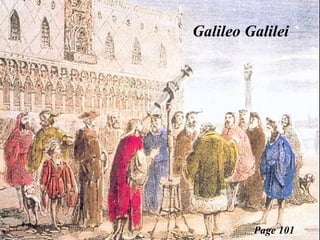
Galileo
- 1. Galileo Galilei Page 101
- 2. Galileo was one of the first modern scientists. He was born in Pisa, Italy, in 1564.
- 3. Galileo was one of the first modern scientists. He was born in Pisa, Italy, in 1564.
- 5. At first he studied philosophy, but later he studied mathematics and astronomy.
- 7. He was interested in the way the earth and other planets move around the sun.
- 9. He found out several important facts about our world. He also started a new way of working in science. Before Galileo, scientists did not do experiments. They just guessed how something happened. Galileo was different. He did not just make guesses. He did experiments and watched to see what happened.
- 10. What was this paragraph about?
- 11. Galileo was famous for his study of gravity (how and why things fall). He was the first person to do experiments about this problem. Before, people thought that heavy things always fell faster than light things.
- 12. He took a heavy ball and a light ball, and dropped them both from a high space. They fell at the same speed.
- 13. This meant that weight was not important. This is the law of falling bodies. It is an important law for understanding our world.
- 14. What was this paragraph about? a. Galileo’s trouble because of his scientific ideas. b. The life and work of Galileo. c. Science in the 1500’s
- 15. What was this paragraph about? a. Galileo’s trouble because of his scientific ideas. This is too specific. b. The life and work of Galileo. This is correct. c. Science in the 1500’s This is too general.
- 16. The life of a scientist was not always easy in the 1500’s. In fact, Galileo got into trouble because of his scientific ideas. His ideas were not the same as religious ideas of the time. Many religious people disagreed with him.
- 18. During his whole life, he had to worry about this. He even went to prison for a while.
- 19. The trial of Galileo in 1633.
- 20. But no one could stop him from thinking. He continued to look for scientific answers to his questions about the world.
- 21. What was this paragraph about? a. Galileo’s trouble because of his scientific ideas. b. The life and work of Galileo. c. The trial of Galileo.
- 22. What was this paragraph about? a. Galileo’s trouble because of his scientific ideas. This is correct. b. The life and work of Galileo. This is too general. c. The trial of Galileo. This is too specific.
Hinweis der Redaktion
- http://universe-review.ca/option2.htm
- http://antwrp.gsfc.nasa.gov/apod/ap960830.html
- http://www.tuscany-charming.it/en/places/arezzo.asp
- http://www.windows.ucar.edu/tour/link=/mythology/images/astronomer_jpg_image.html&edu=high
- http://www.gcse.com/eb/solar_system.htm http://www.gcse.com/eb/solar_system.htm
- http://www.uky.edu/~holler/msc/discover/galileo/galileox.html
- http://www.blabla4u.com/sites/blabla4u/ForumsII.asp?ForumID=14823
- http://web.hao.ucar.edu/public/education/sp/images/trial.html
- http://www.galilean-library.org/galileo4.html
